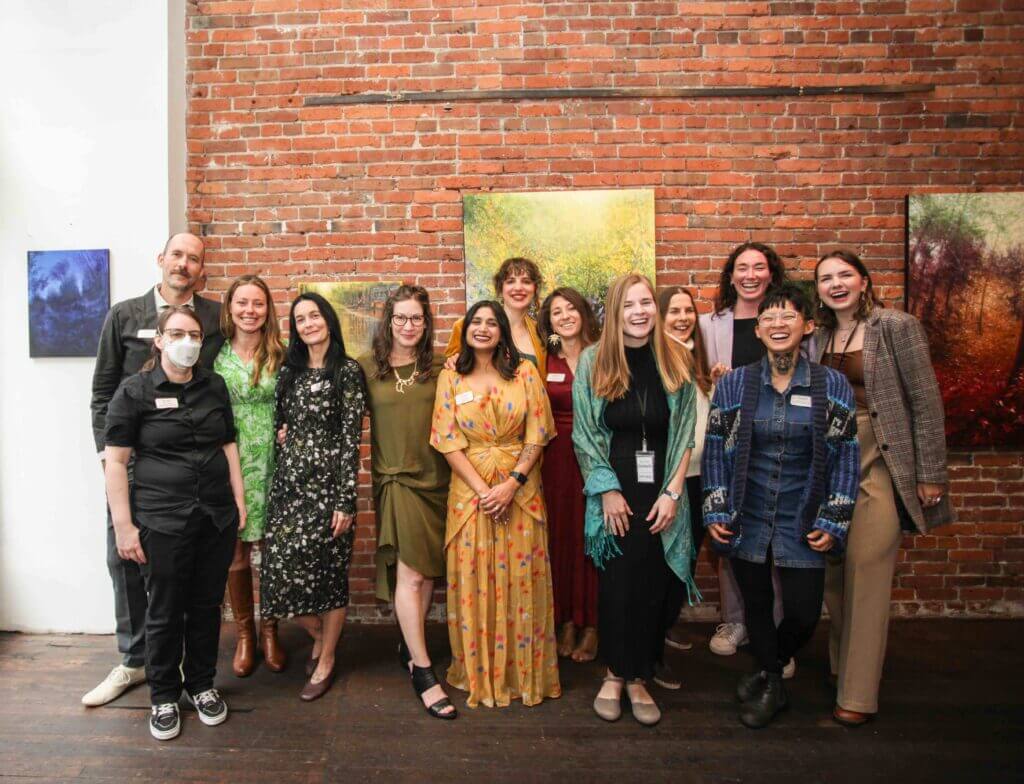
Kia Guarino, 2020-2023
It is not easy to sum up a job that has been one of the most challenging and most rewarding adventures of my career.
Let’s start with this: On my first official day on the job as the executive director of a reproductive rights organization, Justice Amy Coney Barrett was sworn in, sealing the fate of Roe v. Wade.
This was, of course, just the beginning of what would be three years of ups and downs. Now, reflecting on my time as executive director of Pro-Choice Washington, I have deep gratitude for the incredible staff, board members, donors, and partners who helped shape the organization’s vision and the direction we are going today.
Even during this inflection point in American politics and human rights, we built a strong institution with a clear voice. I am endlessly proud of this work.
In the Beginning
I joined this organization in the fall of 2020 when Pro-Choice Washington was still affiliated with what was then NARAL Pro-Choice America. It was the height of the COVID-19 pandemic, a significant period of transition for the institution, and a tumultuous time for America.
In addition to the COVID-19 pandemic, the US faced a time of change and instability. The Black Lives Matter movement forced an important and necessary reckoning of the country, broadly, and reproductive rights organizations specifically with racist histories and harmful actions. The 2020 election and the January 6th insurrection threw our democracy into crisis. And, not least, the leaked Dobbs decision, the overturning of federal abortion rights, and court rulings against medication abortion, along with a cascade of anti-trans policies and abortion bans, demonstrated a willingness for the country to roll back hard-won human and civil rights.
I took the role initially because I saw the writing on the wall for reproductive health, rights, and justice in America and I wanted to be on the ground to do something about it. The rest was an unexpected challenge and, at the same time, a unique opportunity to help shape an institution – alongside an incredible team, board, and set of partners – in a time of change.
Our Transition to Independence
Less than one year into my tenure as Executive Director, our staff received notice that NARAL was ending its half-century of affiliation with all its state-based organizations. We were taken aback, to say the least. Pro-Choice Washington and all 10 state-based affiliate organizations were given the choice to relaunch as new organizations — or to close for good. The timing was particularly harmful because abortion rights were about to be sent back to the states by the Supreme Court.
In this moment of forced evolution, we took the time to ask our community whether we should continue to exist — and received a clear yes, that we still had a role to fill in this movement. So, we at Pro-Choice Washington chose to do the impossible. We rebranded and relaunched as a new organization in just over four weeks. We saw this as an opportunity to redefine our voice and our approach to better align with our values and the unique needs of our community.
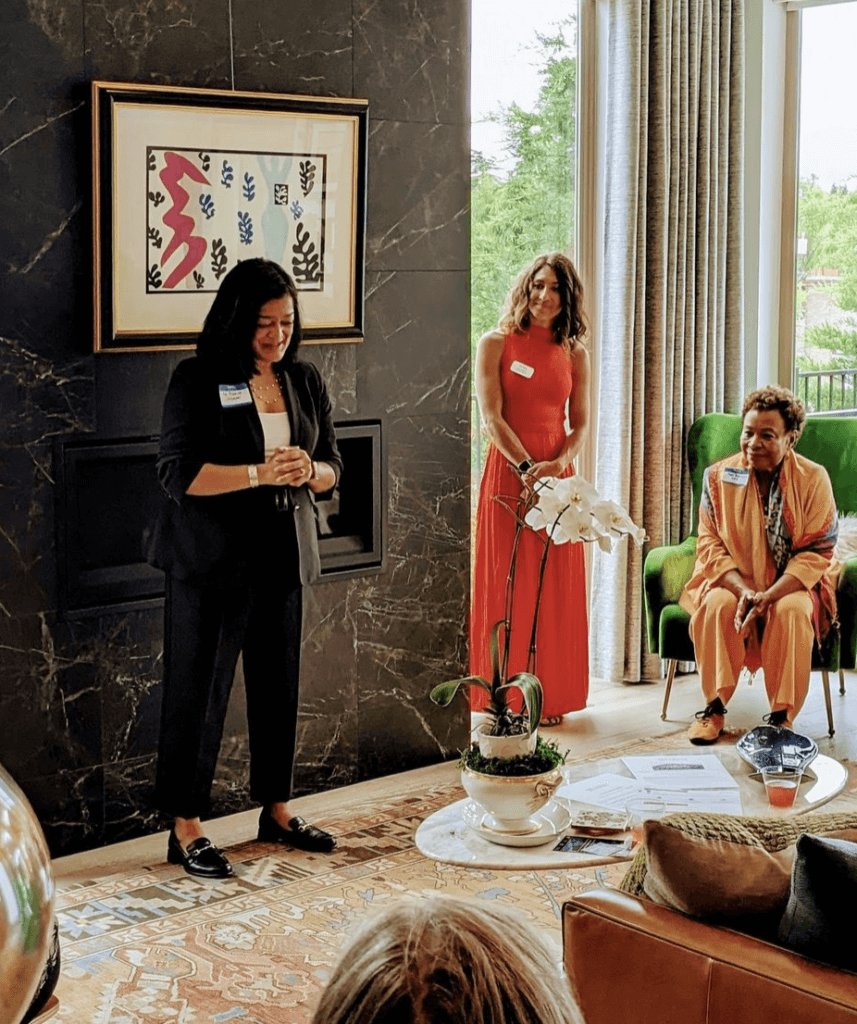
I worked with fellow executive directors and major national foundations to secure $2 million dollars to distribute to all state-based organizations to survive the transition, which could easily have forced small organizations to shutter when state-based activism was most needed. As a result, every former state-level affiliate made the transition.
This rapid transition to independence was also the origin of the State Abortion Access Network, a state-led, operational support organization designed to help small, state-based advocacy nonprofits keep momentum during external shocks like this one. We helped vision and launch this important institution alongside Pro-Choice Ohio, Repro Equity Now, Abortion Action Missouri, and Pro-Choice Oregon.
Our Infrastructure Upgrades
I was lucky to join an established institution with a rich history and decades of proven work. Yet much of this great work was happening on thin infrastructure, and under the affiliation of a national organization that was not providing sufficient support for operational needs.
As a result, internal and organizational changes were required to allow Pro-Choice Washington to meet the moment. These evolutions included transitioning from an in-person office to a hybrid working environment; rebuilding operational infrastructure; enacting anti-racist policies and practices; and completely reshaping our brand and our strategic vision.
My first year on the job was about learning and rebuilding. It involved working with the board and team to identify and address critical infrastructure and operational issues; building a centralized filing system; creating standardized operational policies and a more transparent and consistent financial system; refining and redefining job descriptions; make strategic financial decisions; building communications policies and strategies; and laying the groundwork for a network of supporters who share our vision of a more equitable and forward-thinking organization.
This experience solidified even more for me the importance of general operating funds, and the willingness for funders to create the financial space for organizations to establish strong operational foundations on which to do their programming work. Advocacy organizations are almost entirely about the team, given the people-centered nature of our work, so ensuring that people are supported and that their workspace is functional is essential.
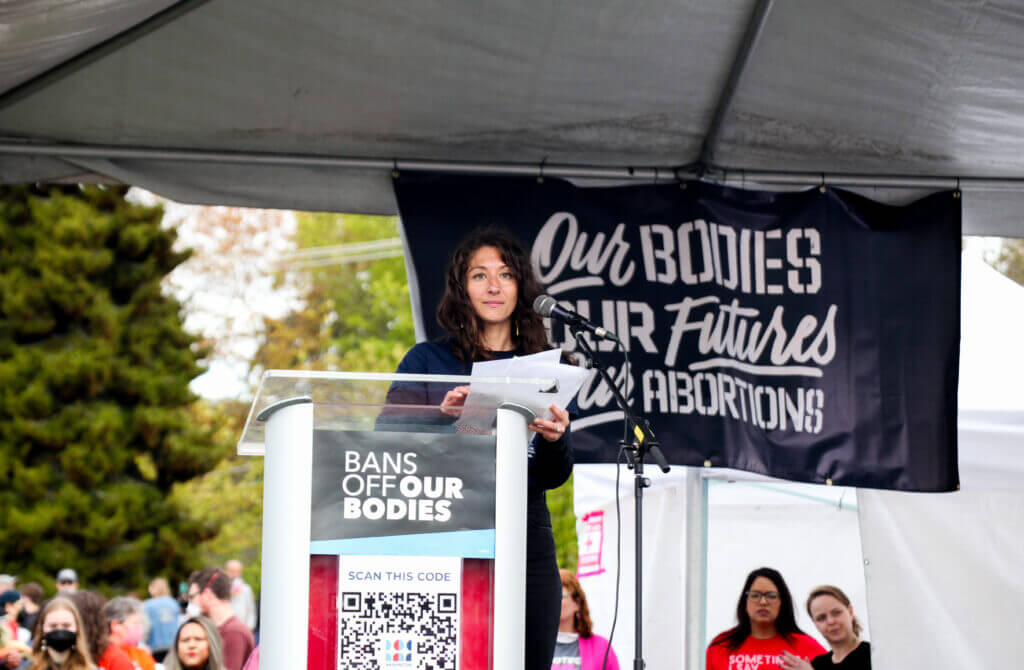
More Equitable Policies and Practices
Meanwhile, I had been working with our team and board to not only reckon with the broader movement’s history but to make our organization more sustainable and inclusive for the people who worked here. This work started prior to my arrival, with both Gabbi Nazari, Organizing Director, and Lillian Lanier, Political Director, who were dedicated to showing up in the community from a place of listening and equitable engagement.
One of the most important values we brought to this process was to put these reflections and community input into action. We started hosting monthly staff meetings where team members bring forward resources and discuss intersectional issues related to our work and their experiences, after which we identify action items to implement in our strategic and annual planning. At the same time, our political and organizing team, led by Deputy Director (now Interim Executive Director) Sami Alloy, overhauled our candidate endorsement process to be more transparent and equity focused. This has allowed us to make some truly exciting partnerships and endorsements. And with the help of Organizing Director, Sarah Dixit who is based in Spokane, we’re in the process of revisioning the organizing work to make sure that we are truly state-wide.
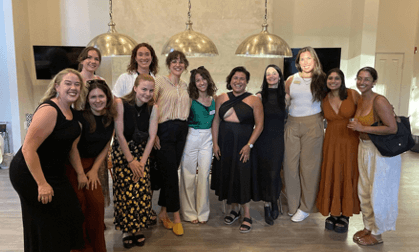
I also hold a deep commitment to making workplaces as supportive and welcoming as possible. We did this by creating the organization’s first equitable and transparent salary bands and hiring practices; raising salaries by more than 40% with a sustainable pathway to meeting livability measures across multiple criteria; implementing standard promotion processes; launching a retirement program for all staff; taking on 100% of health care premiums; and completely overhauling our Personnel Policies to be aligned with the Anti-Racist HR Guide, and to be overall more inclusive, more generous with staff needs and time off, and updating our FMLA to six months.
These, frankly, are still just a start. But they were important for living our belief in the value of our team and the truly incredible work they do every day.
Our New Programs
One of the great privileges of this role was the opportunity to collaborate with community partners who have been doing this hard work for years. Even during the darkest moments, this group of people met the occasion with resolute humor and clear-eyed determination. It made it possible to navigate the heartbreak of the Dobbs decision.
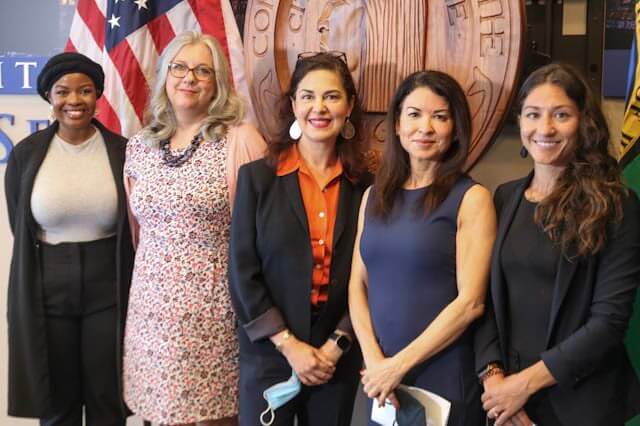
It also encouraged me and our team to think more deeply about how we engage people beyond the borders of Washington state, recognizing that abortion policy may have state lines, but abortion access reaches well beyond them. This was also a time when misinformation and disinformation were everywhere, and we were constantly being asked, “how did we get here?” and “what do we do now?”. These conversations and collaborations led us into the visioning process for several exciting campaigns and education programs in the lead up to and the immediate aftermath of the Dobbs decision, about which I am very proud.
In 2022, we co-launched the Northwest Abortion & Gender Justice Coalition, which focuses on inclusion, collaboration, and community while protecting bodily autonomy and the full range of reproductive, sexual, and abortion care. It is made up of more than 25 abortion funds, advocacy organizations, community groups, professional medical associations, and community members who are working on abortion and gender-affirming care. There are so many facets to making abortion and gender-affirming care truly accessible, and every one of these organizations and activists has an important role to play.
We also hosted the Future of Abortion Campaign, a multimedia communications campaign that engaged 170,000 young people across the Northwest. It included billboards, posters around Seattle, and digital advertisements that focused on compassion, welcoming language, and support for people needing abortion care in Washington. We heard from abortion clinic staff that they would drive out of their way to pass the billboards before work to give them encouragement and to remind them that there are people who believe in them and their work.
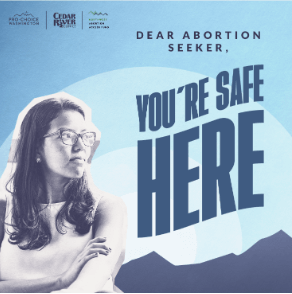
In the lead up to the overturning of Roe, we also spent many months writing and publishing the How to Talk About Abortion guide, a resource to help people have meaningful, accurate, and inclusive conversations about abortion care in a time when misinformation and harmful language was rampant. It has been used by lawmakers and media to drive culture change around abortion, and we are in the process of preparing the second edition and a Spanish language version. Abortion is a healthcare procedure that has been politicized, and change begins with conversation and social acceptance.
In early 2022, we also launched Conversations for Change, a series of educational panel discussions that focus on a specific aspect or intersection of reproductive healthcare. We discussed the impact of the Dobbs decision in 2022 and the importance of health data privacy in 2023, when private data is being used to surveil and criminalize people, which helped pass the nation’s first health data protection act. I am proud of these events because they brought in new people to this movement, gave incredible community leaders like Attorney General Bob Ferguson the space to talk about how cross-cutting and nuanced this issue really is, and – most importantly – gave people the tools to do something about it.
Our Expansion of Community Centric Fundraising
Of course, all these changes and new programs needed to be resourced. Fundraising for a political organization that is almost entirely funded by individual contributions is a unique challenge, to say the least. But it was also an exciting opportunity to get to know our donors, to build new relationships with people and funders, and to think creatively about how we make our fundraising activities more community centric. After several years of holding steady, we had to really think about how to tell our story and to whom to raise our annual income.
We spent a long time building strong relationships with donors and foundations over the years. We also spent time expanding options for donating, hosting a range events to include more people, expanding who and how we engage people, and better documenting our work and our impact, including our first Annual Report. We are lucky to have so many people who believe in the value of reproductive health and rights advocacy, and who trust our ability to do this work. Thanks to these invaluable supporters, we increased our annual operating budget by 33 percent in under three years.
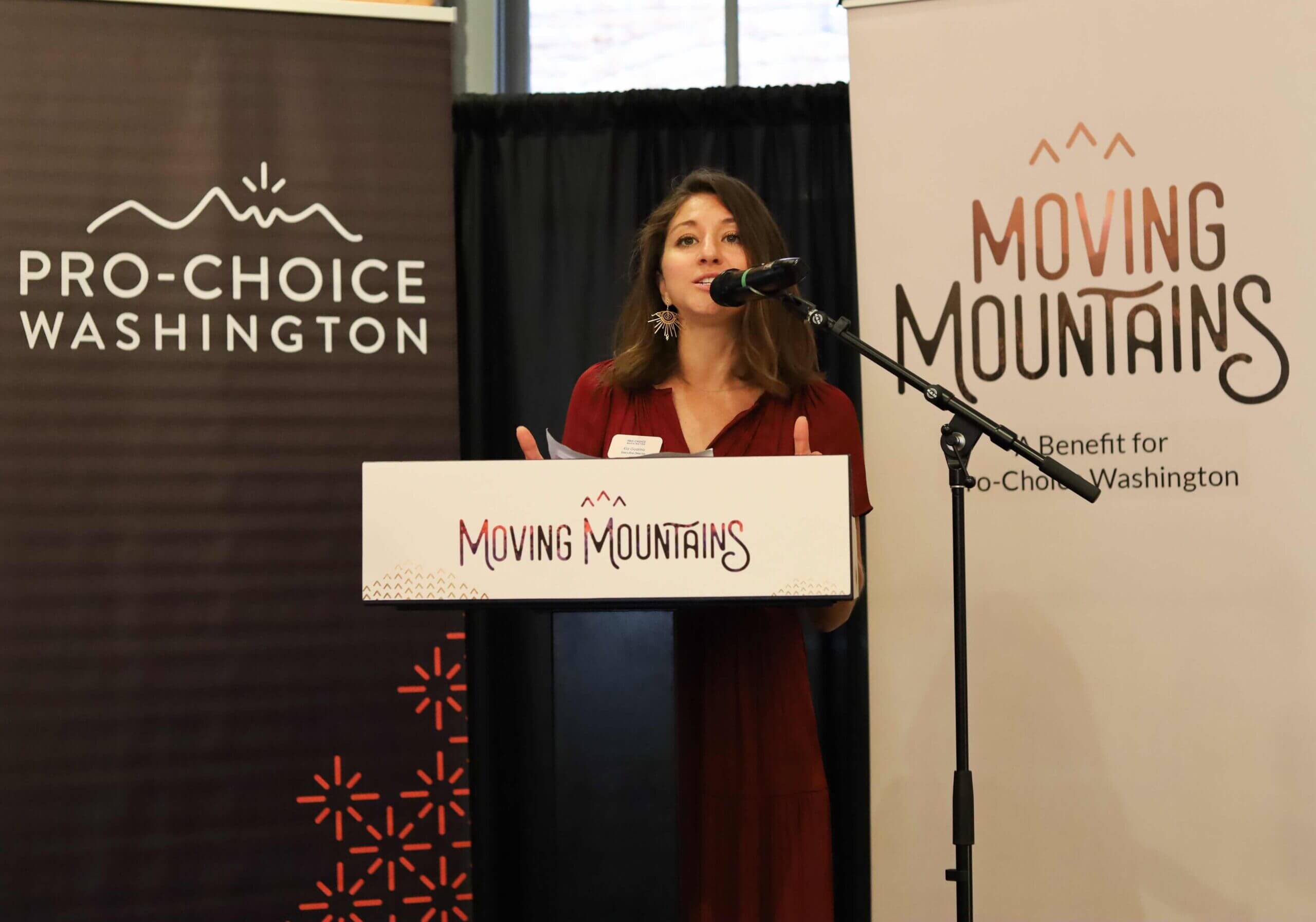
Our growth in membership and funding was also largely impacted by Abigail Faylor and Ryan MacDonald, Communications Director, building strong communications and a clear voice for Pro-Choice Washington, as well as a series of events spearheaded by Hilary Wilson that partnered with creative entities to produce unique experiences– chef’s dinners, artist partnerships, and more– that brought an eclectic community together through our shared commitment to reproductive rights. We also launched the annual Gifting Guide, which celebrates our more than 100 business partners, almost entirely local women, LGBTQI+, Black, and/or Indigenous owned. These were all essential for shaping how we showed up in the community and I am proud of the voice and brand that we shaped over the years.
Our New Strategic Direction
I believe deeply in the value of a shared strategic vision for an organization, particularly an organization that makes incremental change like ours. Over nearly two years, I worked with the team and board to think deeply about who we are and what we want to accomplish in relation to the broader reproductive health, rights, and justice movement. It was a true labor of love, and it resulted in a five-year strategic plan and vision that reflects the remarkable ambition of our organization. It is also built on nearly two years of direct community feedback to make sure it was rooted reality.
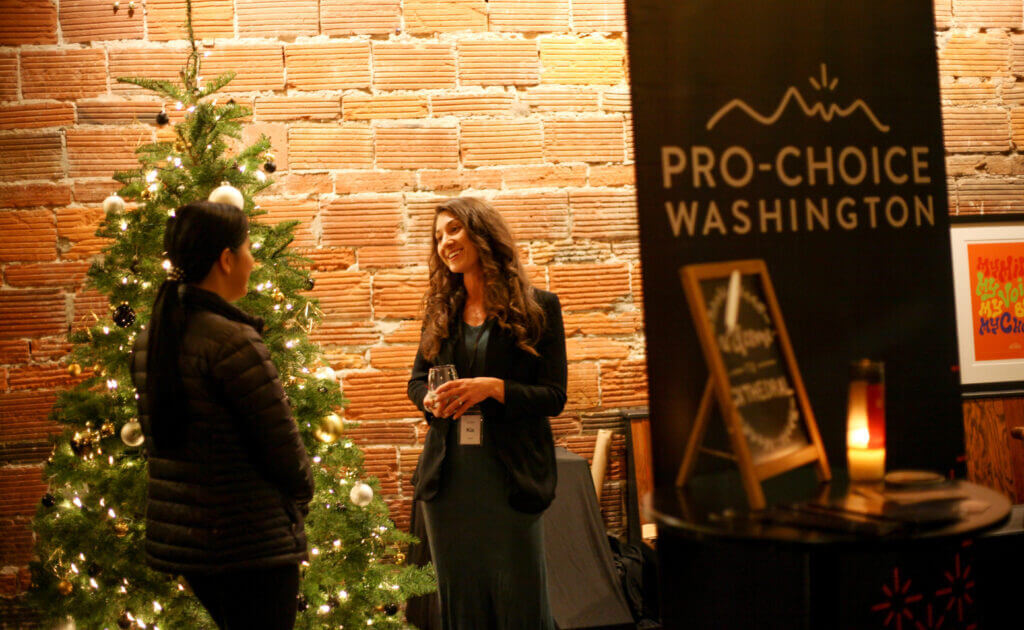
It was especially important to me to build a living document that wouldn’t gather dust on a shelf. And I truly believe we accomplished this in our ambitious and bold strategic plan that is working to drive real and deep change in the Northwest. You can read more about the process for getting there in this earlier blog post.
Our Path Ahead
Today, Pro-Choice Washington has a clear set of values that shape how we operate in the community and movement, and that we put into practice within our own culture. We have built a team of incredibly talented people who are powerful, honest, clear-headed, and committed. And we have built a brand that is meaningful to people.
I have big dreams for Pro-Choice Washington and the movement in the Northwest. The organization has a strong foundation on which to grow, and the possibilities are endless. That said, we are still in an incredibly challenging sociopolitical and economic climate. We are headed into a deeply contentious political year while states continue to roll back reproductive and trans rights at an alarming rate. Within this climate, overall giving trends across the US have dropped dramatically, in part because we are all feeling overwhelmed by the number of crisis issues we want to support. It is going to take the continued support of our donors and partners to navigate through another challenging time. I, personally, will remain part of this movement in my new role and in my personal life.
I am confident that Sami Alloy as interim Executive Director along with the incredible board and team will shepherd in many more exciting opportunities as Pro-Choice Washington continues to ask itself the hard questions, to lean into community and collaborative opportunities, and to stay committed to equity and transparency.
I believe the organization will continue to hone its voice, leaning into its role as an unapologetic and bold advocate for all people; to invest in its people; and to become closer and closer to an anti-racist institution. I hope to see a continuation of Pro-Choice Washington’s powerful legislative advocacy work, as we still need to safeguard reproductive and trans rights in Washington, and to see a growth in our collaborative work across borders and issues. This is just the beginning.
I am leaving proud of the incredible progress we have made during a difficult three years and confident that Pro-Choice Washington will continue its exciting trajectory well into the future. I am committed to staying in this movement and I cannot wait to collaborate with Pro-Choice Washington in the future.
As I head into my next role, I want to thank you for your support and belief in this work. It has meant the world.
